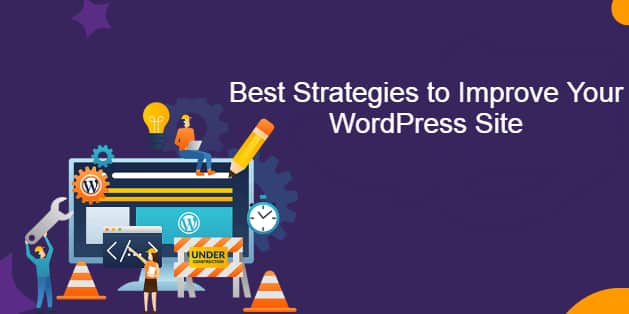Do you want to improve your WordPress site performance? Speed up your WordPress website, improve user experience, increase traffic, and help in SEO. We will share the six best strategies to optimize your WordPress website that boost your website speed and performance.
WordPress was originally invented for blogging but after its popularity and advancement, it has become a popular CMS for enterprises, startups, and organizations. In 2020, the expectations have changed from WordPress compared to what we had in 2009. It’s not just the ability to create a website with some pages, we need good design, high speed, and optimized websites. You just need to consider the right strategies to improve the overall performance of the site. We have prepared the top 6 tips to improve your WordPress website performance.
1. Audit your Website
Many times, we forget where we started and where we at with our current website. High use of plugins in WordPress may affect the overall performance of your site. You should conduct an audit to make sure what is happening in the backend and what improvements you can make. Using various tools, such as Best LMS Plugins, you can quickly identify issues, errors, and updates needed for your WordPress site.. We recommend GTMetrix, Google Search Console, and Google Insight to conduct an audit of your site. You will get a detailed report and know how your site is performing and what issues you need to work on. These tools will provide most of the data and you will analyze it on different parameters as follows:
- Use Google Webmaster to check for any coverage issues and indexing issues.
- Use Google PageSpeed Insight to check the load speed of your page. Work on improving the page speed.
- Using Webmaster, check the sitemap of your website. Sitemap should be submitted to Google to make sure all your pages are indexed.
- Images are quickly loading on the webpages.
Niche Digital Solutions
If you need custom WordPress development services for your business, we will work with you as your partner.
Strategy
Design
Development
Support
2. Image Optimization
Image optimization is a very crucial task on WordPress sites, specially when your website has lots of media files. You can compress the images before uploading to your site or you can install a plugin to automatically optimize image size before submitting.
- Use image compression tools or WordPress plugins. Make the image smaller without sacrificing quality. This will increase the loading speed of the page.
- Use tools like TinyPNG for image compression.
- Make sure the size is proper and it does not look ugly.
- Install a plugin called Smush image optimization or Imagify to compress the images in WordPress.
3. Remove Unwanted Plugins and Themes
Over the period of time, your developer may have installed server plugins that you may not need right now. Unused plugins can ruin the user experience, by not rending the content right or not loading the page in time. Unused plugins will increase the page load time, which can annoy your visitor. Unnecessary plugins can create page break or compatibility issues. You should remove the plugins you no longer need. You can just deactivate the unused ones and then delete after a week. Once you deactivate, you should test the website to make sure everything is working fine. You can use Media Cleaner to scan all the plugins and tell you to delete which is not in use.
4. WordPress Database Optimization
Databases can have junky files and become cluttered over the period of time. Instead of letting these pile-up and affect your performance, you can actually get rid of these files either manually or with the help of a plugin. If you have access to your MySQL backend database, you can manually remove which are not being used. Another option is to use a plugin called DBManager or WP-Optimize. Using these plugins, you can easily optimize, backend, restore, and repair databases. You can also restore an older version of your database.
5. Choose a Powerful Hosting Environment
Hosting services have big impact on your website security and performance? Many times, you start with a shared hosting package to save the cost. It might be fine in the beginning, but as your site grow, you may have to upgrade to dedicated hosting. Cheap dedicated server hosting will provide you a fixed IP and also more processing power and database storage for your site. Your website load speed and security will be much better. As a site owner, you should use a dedicated hosting plan that provides you at least 1GB of RAM to have better response time. Also, use CDN to store copies of your site on servers across the globe. For example, dedicated WordPress hosting is best for websites based on WordPress CRM.
6. Use of Caching Plugins
A high volume WordPress site definitely require caching. Caching does not require information to be retrieved from the database or CSS. A cache can store a static HTML file and whenever the same page or post is requested to crawl, it will quickly load. Using a caching plugin is very convenient and you can store versions of those static files to load anytime. Many organizations use W3 Total Cache and WP Super Cache to maintain cache files. Several web hosting also provides built-in caching features. You just need to explore them and start using them.
Final Points
We suggest WordPress for website development because you can easily maintain it using a few tools. Also, there are several things you can handle yourself and improve the site day by day. There is no need to call the developer all time. Just educate yourself and start doing right away. Improving online presence is the most critical task in this competitive environment. We assume that the above strategies will definitely help in improving your site performance and building a larger user base.

 App Development
App Development Web Engineering
Web Engineering AI Services
AI Services Health / Fitness
Health / Fitness Education
Education Social
Social Nonprofit
Nonprofit Fintech
Fintech Logistics
Logistics Government
Government HR Software
HR Software About Simpalm
About Simpalm Our News
Our News Client Testimonials
Client Testimonials Careers
Careers Awards
Awards Resources
Resources Information
Information


